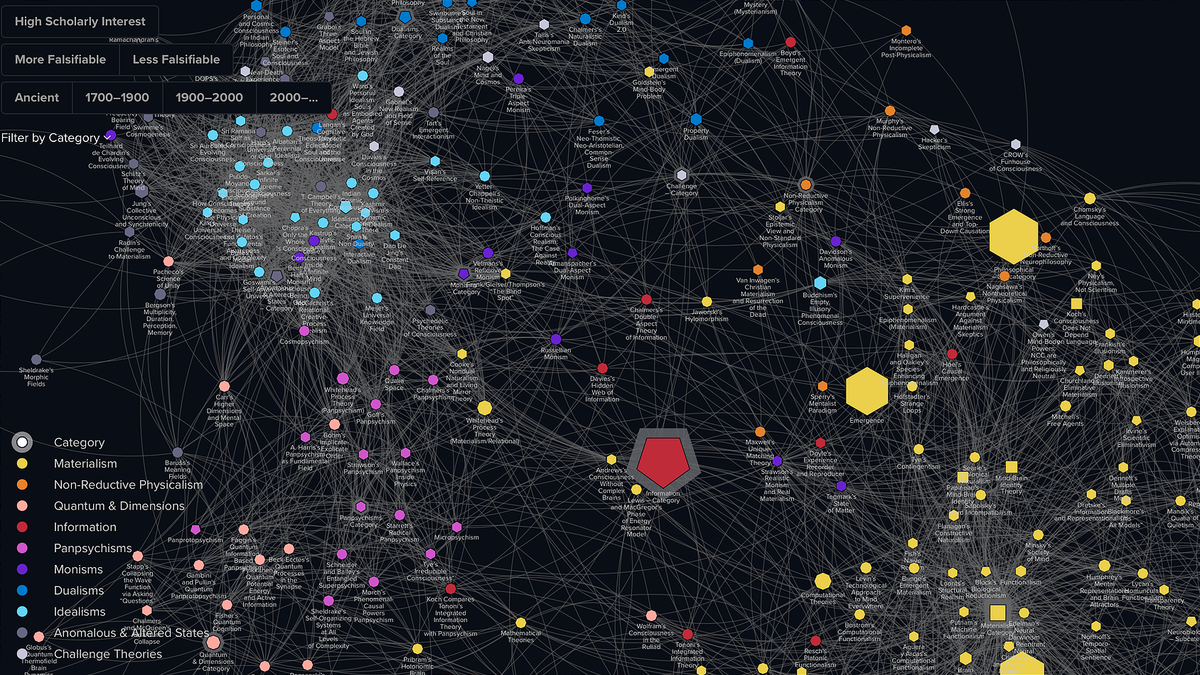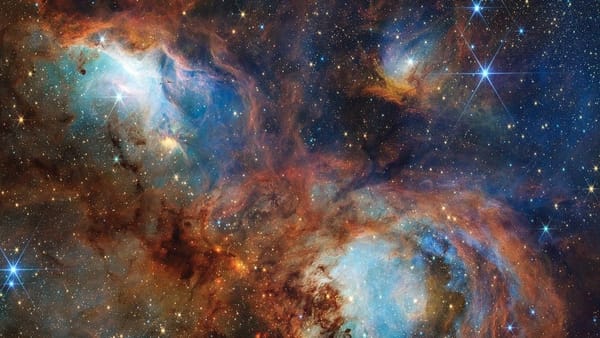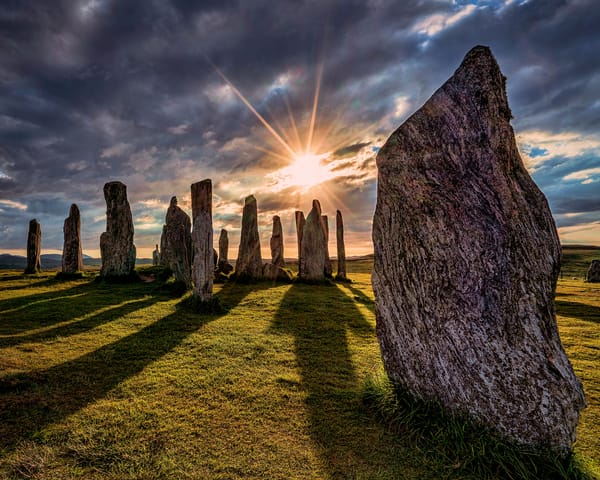What do we mean by consciousness, and why does defining it matter?

The Rundown
From the earliest writings to quantum cosmology, questions about our identity and role in the universe have persisted, conveyed through the myth, philosophy, and science of cultures across history.
Sumerian texts suggest the cosmos is alive with divine intelligence. Ancient Hindu tradition describes Brahman, an all-encompassing essence that underlies and connects all existence. Taoism speaks of living in harmony with the Tao, the natural flow of the universe.
The 13th-century Sufi poet Rumi believed that all of existence is interconnected. In his Divan-e Shams-e Tabrizi, Rumi wrote that nature is not just matter but an aware expression of the divine—a universe alive with consciousness.
"Every leaf that grows will tell you: what you sow will bear fruit.
So if you have any sense, my friend,
don’t plant anything but love.”
Connecting these threads — from ancient wisdom to modern debate —we might ask: Is reality itself conscious? If consciousness is fundamental, then it is a thread that runs through all things, the foundation of a fabric that contains both the self and the cosmos equally. A fabric that is easy to see when you look for it with love, and impossible to find when you don’t.
To examine this further, consider the materialist view of consciousness, which states that consciousness is specific to human physiology and wholly reliant on the brain and/or nervous system to exist. Proponents contend that consciousness is merely a product of neural activity; that the mind is matter organized in a certain way; and that nothing beyond individual physical experience is necessary to explain awareness.
From this end of the spectrum, materialist and neurologist Robert Sapolsky’s research has led him to argue against free will. He contends that everything we do, every action we take, is the result of a long chain of preceding causes. These causes begin with our genetics and hormones and extend to include external factors such as our cultural upbringing, environmental surroundings, and even the time since we last ate. As such, he maintains that there is no true self and that we only perceive our behaviour as a conscious choice.
In contrast, others propose a more panpsychic perspective. They contend that consciousness is fundamental and an inherent aspect of reality itself. Here, the view is that the universe is a single conscious entity, where matter itself is innately conscious, and human consciousness emerges from the combination of simpler forms of experience found throughout the universe.
Brian Josephson, a Nobel Prize–winning physicist and founder of the Mind–Matter Unification Project at Cambridge University, has proposed that there is “something happening beyond the universe, on a larger and possibly infinite timescale, that has organization and is doing things like bringing a universe into being, setting up its laws, and perhaps partly directing its evolution.”
Guided by the motto "take nobody's word for it," Josephson investigates topics often regarded as outside mainstream science, such as the role of consciousness in nature and the relationship between science and philosophy. He cautions, “If scientists as a whole denounce an idea, this should not necessarily be taken as proof that the said idea is absurd; rather, one should examine carefully the alleged grounds for such opinions and judge how well these stand up to detailed scrutiny.”
Physicist and engineer Federico Faggin has recently taken a further step by developing a theory he calls Quantum-Information Panpsychism, which argues that consciousness is not emergent but a fundamental aspect of reality. He suggests that “the holistic whole (a single, all-encompassing reality from which everything else originates) contains not only the seeds of the inanimate universe but also those of free will, consciousness, and life.”
Faggin explains his theory in his book Irreducible: Consciousness, Life, Computers, and Human Nature: "We are spiritual beings temporarily imprisoned in a physical structure similar to a highly sophisticated drone… we are seities (quantum entities) who temporarily ‘inhabit’ our bodies. We are eternal, conscious beings rather than perishable bodies. And we are here to learn crucial aspects of ourselves by interacting with each other in the physical universe that we have co-created for this very purpose.”
Donald Hoffman, a cognitive scientist whose research examines the relationship between perception and reality, argues in his Interface Theory of Perception that perception functions as a user interface—an adaptive representation shaped by evolution not to reveal objective truth but to favour survival.
Hoffman delves deeper into this idea in The Case Against Reality: Why Evolution Hid the Truth from Our Eyes (2019). Here, he outlines his Theory of Conscious Reality, suggesting that “consciousness, not spacetime and its objects, is fundamental reality and is properly described as a network of conscious agents.” As Hoffman states, “Physics and evolution point to the same conclusion: spacetime and objects are not foundational. Something else is more fundamental, and spacetime emerges from it.”
All of this presents more questions than it answers:
* Is a purely biological understanding sufficient to explain consciousness? Or do our current perspectives limit our understanding of reality, reason, and the shared experience of sentient beings?
* Do we agree that claiming only humans possess the gift of reason, while other life forms don’t, is an outdated way of thinking?
* Do deeper levels of reality exist beyond what we as humans can subjectively perceive?
To capture this wide variety of thought, Robert Lawrence Kuhn, creator and host of the long-running PBS program Closer to Truth, has recently released his magnum opus, A Landscape of Consciousness: Toward a Taxonomy of Explanations and Implications (Kuhn, R.L. 2024). This volume essentially serves as an encyclopedia compiling all known "diverse explanations or theories of consciousness.”
This work includes over 325 theories about consciousness and groups them into ten categories, including materialism, dualism, idealism, and panpsychism. Kuhn’s aim is not to determine which theory is correct, but rather to deepen our understanding of consciousness and encourage reflection on the implications of each theory's meaning. This comprehensive resource highlights how defining what we mean by consciousness influences every philosophical and scientific question that arises.
As Kuhn states, “It’s not that we have too many theories [on consciousness], it’s that we have one too few.”
The Record
Essentia Foundation Podcast "325+ Competing Consciousness Theories In One Video"
The full text of Kuhn's A Landscape of Consciousness: Toward a Taxonomy of Explanations and Implications (Kuhn, R.L. 2024) can be found here:
The Landscape of Consciousness website (which is regularly updated) can be found here:
Dr. Sapolsky at Stanford, giving a talk on free will as part of the Science & Society Initiative.
Closer to Truth Podcast - Brian Josephson in discussion with Robert Lawrence Kuhn
note: deep dives into the work of Faggin and Hoffman, are planned soon
© 2025 The Sentient Universe. All rights reserved.



